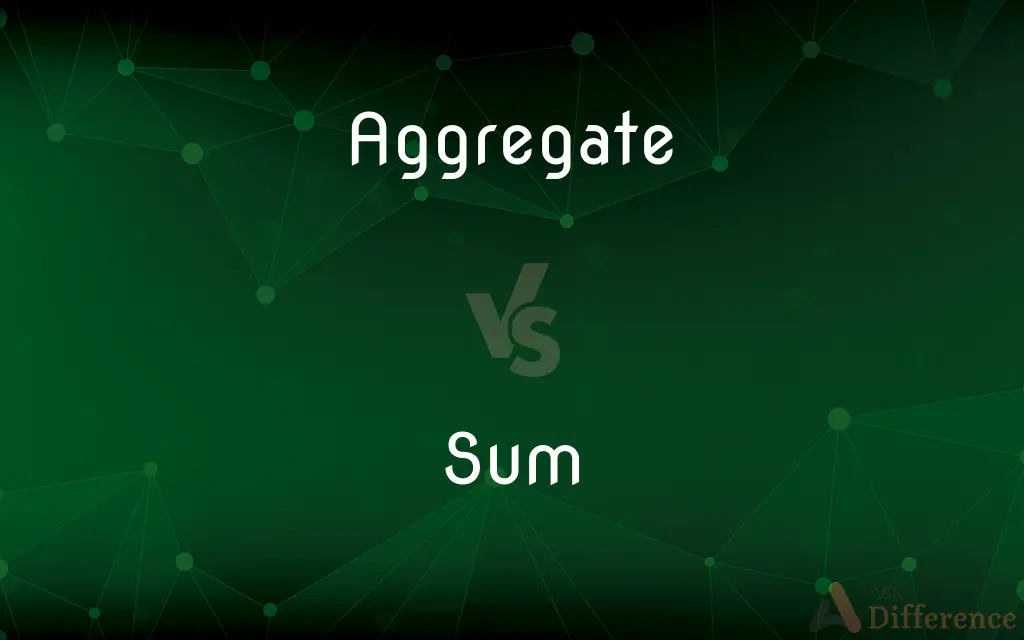Aggregate vs. Sum — What's the Difference?
Edited by Tayyaba Rehman — By Maham Liaqat — Updated on April 15, 2024
Aggregate involves combining elements into a whole, while sum specifically refers to the total result of adding numbers.

Difference Between Aggregate and Sum
Table of Contents
ADVERTISEMENT
Key Differences
Aggregate is used more broadly to describe the collection or gathering of items into a single group, which may include numbers, concepts, or physical objects. Whereas sum is specifically used in mathematical contexts to refer to the total obtained by adding numbers.
Aggregate can be applied in various fields such as economics, data analysis, and geology, indicating a collection or accumulation of different units. On the other hand, sum is primarily used in arithmetic and accounting to denote the result of addition.
Aggregate may also refer to materials composed of a mixture, such as aggregate in construction, which includes sand, gravel, and crushed stone. Whereas sum does not imply any physical materials but is purely a numeric total.
Aggregate implies a process of addition but also includes the concept of gathering without specific regard to numerical addition. On the other hand, sum always involves the operation of adding figures.
Aggregate can serve as both a noun and a verb, reflecting the action of gathering or the final grouped total. Whereas sum is predominantly used as a noun, but it can also be a verb specifically in the context of adding numbers.
ADVERTISEMENT
Comparison Chart
Definition
A whole formed by combining elements.
The total result of adding numbers.
Usage in Mathematics
Used broadly for totals or collections.
Strictly used to denote addition total.
Application in Fields
Economics, construction, data analysis.
Arithmetic, accounting.
Form
Can be a noun or a verb.
Primarily a noun, occasionally a verb.
Physical Materials
Often used to describe mixed materials.
Does not refer to physical materials.
Compare with Definitions
Aggregate
A total formed from smaller units.
The aggregate audience of the concert series was over 100,000 people.
Sum
The total obtained by adding numbers.
The sum of 5 and 7 is 12.
Aggregate
A material like gravel used in construction.
The road base consists of a layer of aggregate under the asphalt.
Sum
A concise statement or brief.
In sum, the project was a major success.
Aggregate
The result of gathering or amassing.
The aggregate effect of the changes was a more efficient workflow.
Sum
An arithmetic computation of addition.
Children learn to calculate the sum of figures in elementary school.
Aggregate
To form or group into a class or cluster.
We need to aggregate the data for clearer insights.
Sum
The essence or gist of an argument.
The sum of his speech was about the need for change.
Aggregate
The entirety of a species or genus in biology, seen as a group.
This aggregate of plants shows similar genetic characteristics.
Sum
To calculate a total.
Summing these expenses gives us a clear idea of the budget.
Aggregate
A whole formed by combining several separate elements
The council was an aggregate of three regional assemblies
Sum
An amount obtained as a result of adding numbers.
Aggregate
A material or structure formed from a mass of fragments or particles loosely compacted together
The specimen is an aggregate of rock and mineral fragments
Sum
An arithmetic problem
A child good at sums.
Aggregate
Formed or calculated by the combination of several separate elements; total
The aggregate amount of grants made
Sum
The whole amount, quantity, or number; an aggregate
The sum of the team's combined experience.
Aggregate
Form or group into a class or cluster
Socio-occupational groups aggregate men sharing similar kinds of occupation
The butterflies aggregate in dense groups
Sum
An amount of money
Paid an enormous sum.
Aggregate
Constituting or amounting to a whole; total
Aggregate sales in that market.
Sum
A summary
My view of the world, in sum.
Aggregate
(Botany) Crowded or massed into a dense cluster.
Sum
The central idea or point; the gist.
Aggregate
Composed of a mixture of minerals separable by mechanical means.
Sum
(Mathematics) To add.
Aggregate
A total considered with reference to its constituent parts; a gross amount
"An empire is the aggregate of many states under one common head" (Edmund Burke).
Sum
To give a summary of; summarize.
Aggregate
The mineral materials, such as sand or stone, used in making concrete.
Sum
A quantity obtained by addition or aggregation.
The sum of 3 and 4 is 7.
Aggregate
To gather into a mass, sum, or whole
Aggregated the donations into one bank account.
Sum
(often plural) An arithmetic computation, especially one posed to a student as an exercise (not necessarily limited to addition).
We're learning about division, and the sums are tricky.
Aggregate
To amount to; total
Revenues will aggregate more than one million dollars.
Sum
A quantity of money.
A tidy sum
The sum of forty pounds
Aggregate
To collect (content from different sources on the internet) into one webpage or newsreader.
Sum
A summary; the principal points or thoughts when viewed together; the amount; the substance; compendium.
This is the sum of all the evidence in the case.
This is the sum and substance of his objections.
Aggregate
To come together or collect in a mass or whole
"Some [bacteria]aggregate so closely as to mimic a multicellular organism" (Gina Kolata). "The first stars began to form when hydrogen and helium gas left over from the Big Bang aggregated into dense clouds" (Paul Davies).
Sum
A central idea or point; gist.
Aggregate
A mass, assemblage, or sum of particulars; something consisting of elements but considered as a whole.
Sum
The utmost degree.
Aggregate
A mass formed by the union of homogeneous particles; – in distinction from a compound, formed by the union of heterogeneous particles.
Sum
(obsolete) An old English measure of corn equal to the quarter.
Aggregate
A set collection of objects.
Sum
The basic unit of money in Kyrgyzstan.
Aggregate
(music) The full chromatic scale of twelve equal tempered pitches.
Sum
The basic unit of money in Uzbekistan.
Aggregate
(sports) The total score in a set of games between teams or competitors, usually the combination of the home and away scores.
Sum
A type of administrative district used in China, Mongolia, and Russia. In Mongolia, a sum is smaller than a province. In China, it is only used in Inner Mongolia, where it is equivalent to a township.
Aggregate
(roofing) Crushed stone, crushed slag or water-worn gravel used for surfacing a built-up roof system.
Sum
(transitive) To add together.
Aggregate
Solid particles of low aspect ratio added to a composite material, as distinguished from the matrix and any fibers or reinforcements; especially the gravel and sand added to concrete.
Sum
(transitive) To give a summary of.
Aggregate
(Buddhism) Any of the five attributes that constitute the sentient being.
Sum
Eye dialect of some
Aggregate
A mechanical mixture of more than one phase.
Sum
Eye dialect of some
Aggregate
Formed by a collection of particulars into a whole mass or sum; collective; combined; added up.
Sum
The aggregate of two or more numbers, magnitudes, quantities, or particulars; the amount or whole of any number of individuals or particulars added together; as, the sum of 5 and 7 is 12.
Take ye the sum of all the congregation.
Aggregate
Consisting or formed of smaller objects or parts.
Sum
A quantity of money or currency; any amount, indefinitely; as, a sum of money; a small sum, or a large sum.
With a great sum obtained I this freedom.
Aggregate
Formed into clusters or groups of lobules.
Aggregate glands
Sum
The principal points or thoughts when viewed together; the amount; the substance; compendium; as, this is the sum of all the evidence in the case; this is the sum and substance of his objections.
Aggregate
(botany) Composed of several florets within a common involucre, as in the daisy; or of several carpels formed from one flower, as in the raspberry.
Sum
Height; completion; utmost degree.
Thus have I told thee all my state, and broughtMy story to the sum of earthly bliss.
Aggregate
Having the several component parts adherent to each other only to such a degree as to be separable by mechanical means.
Sum
A problem to be solved, or an example to be wrought out.
A sum in arithmetic wherein a flaw discovered at a particular point is ipso facto fatal to the whole.
A large sheet of paper . . . covered with long sums.
Aggregate
United into a common organized mass; said of certain compound animals.
Sum
To bring together into one whole; to collect into one amount; to cast up, as a column of figures; to ascertain the totality of; - usually with up.
The mind doth value every moment, and then the hour doth rather sum up the moments, than divide the day.
Aggregate
(transitive) To bring together; to collect into a mass or sum.
The aggregated soil.
Sum
To bring or collect into a small compass; to comprise in a few words; to condense; - usually with up.
"Go to the ant, thou sluggard," in few words sums up the moral of this fable.
He sums their virtues in himself alone.
Aggregate
To add or unite (e.g. a person), to an association.
Sum
To have (the feathers) full grown; to furnish with complete, or full-grown, plumage.
But feathered soon and fledgeThey summed their pens [wings].
Aggregate
(transitive) To amount in the aggregate to.
There are ten loads, aggregating five hundred bushels.
Sum
A quantity of money;
He borrowed a large sum
The amount he had in cash was insufficient
Aggregate
To bring together; to collect into a mass or sum. "The aggregated soil."
Sum
A quantity obtained by addition
Aggregate
To add or unite, as, a person, to an association.
It is many times hard to discern to which of the two sorts, the good or the bad, a man ought to be aggregated.
Sum
The final aggregate;
The sum of all our troubles did not equal the misery they suffered
Aggregate
To amount in the aggregate to; as, ten loads, aggregating five hundred bushels.
Sum
The choicest or most essential or most vital part of some idea or experience;
The gist of the prosecutor's argument
The heart and soul of the Republican Party
The nub of the story
Aggregate
Formed by a collection of particulars into a whole mass or sum; collective.
The aggregate testimony of many hundreds.
Sum
The whole amount
Aggregate
Formed into clusters or groups of lobules; as, aggregate glands.
Sum
The basic unit of money in Uzbekistan
Aggregate
Composed of several florets within a common involucre, as in the daisy; or of several carpels formed from one flower, as in the raspberry.
Sum
A set containing all and only the members of two or more given sets;
Let C be the union of the sets A and B
Aggregate
Having the several component parts adherent to each other only to such a degree as to be separable by mechanical means.
Sum
Be a summary of;
The abstract summarizes the main ideas in the paper
Aggregate
United into a common organized mass; - said of certain compound animals.
Sum
Determine the sum of;
Add all the people in this town to those of the neighboring town
Aggregate
A mass, assemblage, or sum of particulars; as, a house is an aggregate of stone, brick, timber, etc.
Aggregate
A mass formed by the union of homogeneous particles; - in distinction from a compound, formed by the union of heterogeneous particles.
Aggregate
A sum total of many heterogenous things taken together
Aggregate
The whole amount
Aggregate
Amount in the aggregate to
Aggregate
Gather in a mass, sum, or whole
Aggregate
Gathered or tending to gather into a mass or whole;
Aggregate expenses include expenses of all divisions combined for the entire year
The aggregated amount of indebtedness
Aggregate
Formed of separate units in a cluster;
Raspberries are aggregate fruits
Common Curiosities
Is sum used outside of mathematics?
Yes, sum can also mean the gist or main point of an argument, although its primary use is in mathematics.
Can both terms be used as verbs?
Yes, both aggregate and sum can function as verbs; aggregate means to collect or gather, and sum refers to the act of adding numbers.
Can aggregate mean something other than a total in numbers?
Yes, aggregate can refer to materials in construction or a collection of items in various contexts, not just numerical totals.
How do aggregate and sum differ in their applications in fields like economics?
In economics, aggregate might refer to combined measures like GDP, whereas sum could be used for simpler, straightforward additions of figures.
What roles do aggregate and sum play in data analysis?
Aggregate is often used to combine data from various sources or categories for analysis, whereas sum specifically refers to adding numerical values within a dataset.
Can the term aggregate apply to biological contexts?
Yes, in biology, aggregate can describe a group of organisms that live closely together or are similar in nature, unlike sum, which is not used in biological contexts.
Does aggregate have a specific meaning in the field of geology?
Yes, in geology, aggregate refers to a mass or body of rock particles, sand, gravel, or crushed stone used in construction materials, which is not related to the mathematical concept of sum.
Is there a difference in how aggregate and sum are used in statistics?
In statistics, aggregate might be used to describe a combined set of data points for analysis, while sum refers to the actual operation of adding values to get a total.
How do aggregate and sum function differently in programming?
In programming, aggregate functions are used to perform calculations on a data set, such as averaging, while sum is specifically used to add up numbers in a list or array.
What is the difference between aggregate and sum?
Aggregate refers to the whole formed from combining several elements, often used beyond just numbers, while sum is specifically the result of adding numbers.
How do aggregate and sum relate to business reporting?
In business reporting, aggregate might refer to total sales across different regions or products, while sum would be used to calculate the total revenue from specific items.
What is an example of using sum in a non-mathematical sense?
Sum can be used to describe the essence or main point of an argument, as in "the sum of his argument was for more transparency."
In which contexts might one use aggregate instead of sum?
Aggregate is more appropriate when discussing collections of different types, such as demographics in a survey, while sum is used when calculating the total of numerical values.
How might an economist use the terms aggregate and sum differently?
An economist might use aggregate to refer to macroeconomic totals, such as aggregate demand or supply, and sum for the simple addition of economic figures like expenses.
What implications do aggregate and sum have in legal contexts?
In legal contexts, aggregate might refer to collective actions or total liabilities, while sum could refer to the total amount of a financial judgment or calculation of damages.
Share Your Discovery

Previous Comparison
Concierge vs. Receptionist
Next Comparison
Melon vs. GourdAuthor Spotlight
Written by
Maham LiaqatEdited by
Tayyaba RehmanTayyaba Rehman is a distinguished writer, currently serving as a primary contributor to askdifference.com. As a researcher in semantics and etymology, Tayyaba's passion for the complexity of languages and their distinctions has found a perfect home on the platform. Tayyaba delves into the intricacies of language, distinguishing between commonly confused words and phrases, thereby providing clarity for readers worldwide.














































